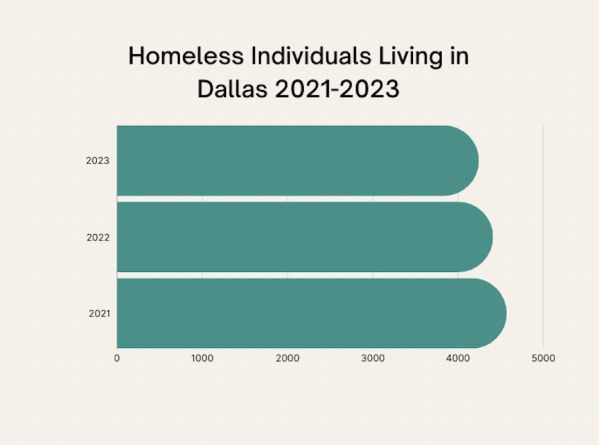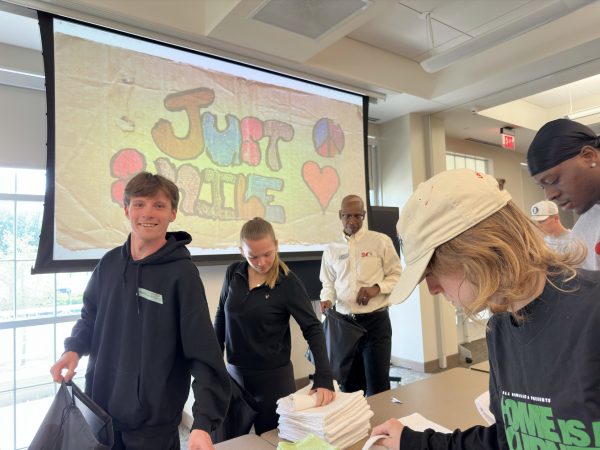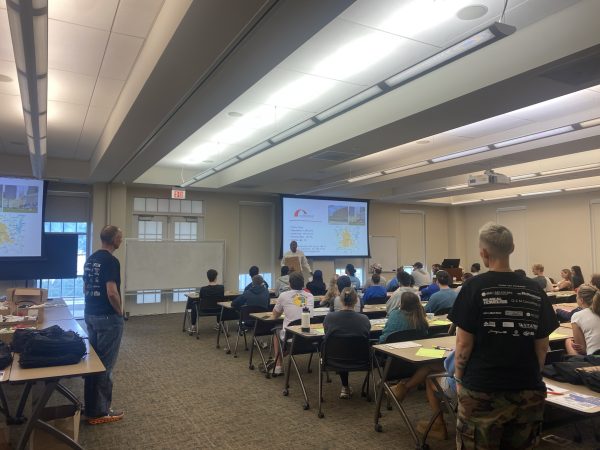More than 400 homeless individuals wake up every morning in Dallas and begin forming a line in front of the welcome center at The Bridge. They wait patiently for the center to open to schedule appointments with their care manager, do their laundry, get a haircut, pick up their mail and grab fresh clothing.
One man towards the end of the line is no stranger to David Woody, president and CEO of The Bridge. This man first arrived at The Bridge five years ago seeking recovery and now has returned five years later, Woody recalled.
“He remembered a conversation I had with him five years ago, saying, ‘I really need you to connect with a care manager and to get with our metro care services to really begin the work on substance use issues,’” Woody said. “I didn’t really remember that, but he could recount that conversation, and it’s just really interesting when folks can recount to you messaging that you offered them compassionately.”
Woody’s message stayed with this man for the last five years and he knew he’d always find compassion, hope and support at The Bridge.
The Bridge, a homeless recovery center for individuals living in Dallas County without a home, currently serves 85% of the homeless population of Dallas County. The services provided include basic needs such as hot showers, haircuts and nutritious meals. It provides care management services and physical and mental health evaluations to approximately 600 guests every day and shelter for 300 guests each night.

Homelessness is not just an issue in the streets of downtown Dallas but is a prevalent issue seen right outside Southern Methodist University’s campus located in Highland Park. As visitors drive in and out of the prestigious, manicured campus, it might be a shock for some to see those who are homeless standing at the intersection of SMU Boulevard and North Central Expressway. This is one aspect that leads to the idea that SMU lives in its own bubble, said Taylure Craven, fourth year CCPA major at SMU. However, there are organizations on campus that are trying to combat this phenomenon and raise awareness.
A few weeks before the close of this past spring semester, Dallas-based organization WE ARE ALL HOMELESS led by SMU professor Willie Baronet and SMU’s LULAC Council joined forces to host a blessing bag event at the Hughes-Trigg Student Center on SMU’s campus. Baronet kicked off the event discussing the mission of his organization and how those who attended can contribute to the cause. Volunteers created bags filled with everyday necessities such as toothbrushes, toothpaste, soap, a pair of socks and even a handwritten note.
In Texas las year, homelessness grew by more than 12%, more than 27,000 Texans didn’t have a permanent roof over their heads and the number of unhoused veterans and families with children grew by 4.9%, according to the U.S. Department of Housing and Urban Development. In the city of Dallas, 20% of residents are living in poverty and the most recent homeless count conducted in January 2023 found that 4,244 individuals were found to be homeless, according to Housing Forward.
In 2023, The Bridge provided 6,350 individuals with day shelter and 1,490 individuals with night shelter. It diverted or prevented 2,126 individuals from homelessness through its information hotline, provided care management to 3,488 guests with a total of 20,375 care management sessions, and provided meals to 5,117 guests through its Second Chance café.
Since opening in May 2008, The Bridge has not only benefited those seeking recovery but the neighborhood it’s located in, Woody said.

“We’re an important part of this area, the farmers market district, and we’re part of a resurgence of this neighborhood,” Woody said. “Crime, as a result of the work that we’re doing within a two-block radius of our campus, has dropped over 55% and property values are up over 350%.”
SMU professor Laura Robinson-Doyle who holds a doctorate in population health hosted an event on campus in mid-April titled “Welcome to the Shelter” to raise awareness for the mission of The Bridge.
“One thing about The Bridge is the hub of services that they offer, I really do believe that they truly equip individuals who are seeking to get off the streets,” Robinson-Doyle said. “That’s the reason I partnered with them.”
At the event, Woody spoke about his daily work at The Bridge while volunteers assembled “Welcome to the shelter” kits, which are similar to blessing bags, but with items that allow the people who are homeless to go to The Bridge and immediately use the facilities and services offered, Robinson-Doyle said.
“This is saying, ‘Hey we’re going to give you a shower, we’re going to give you everything you need, and we’re going to give you a bed but here is all this extra stuff that is going to make you have a little bit more self-esteem and self-value,’” Robinson-Doyle said. “It makes a huge difference and I love the entirety of their holistic, full-service model, versus other shelters.”
Volunteer opportunities for students on campus like the “Welcome to the Shelter” event is important towards getting SMU students involved and educated about homelessness, Craven said.
“There is a bit of a bubble around SMU and there is a whole world outside of SMU,” Craven said. “It’s crucial for individuals to humanize these issues and it’s super important for students to be aware of what’s going on in Dallas and what they can do.”
Getting involved with WE ARE ALL HOMELESS and attending events for organizations such as The Bridge has altered the way Craven interacts with people who are homeless, Craven said.

“These people are hurting, and it used to be awkward and embarrassing but now I roll down my window and ask how they are even if I don’t have anything to offer them. I try to keep water bottles in my car or a few dollars,” Craven said. “It’s important that we expand the visibility and awareness and bring in new audiences that we can get to support this cause because it isn’t going away.”
The first thing that is always shared when discussing causes and solutions to homelessness, are homes, Woody said.
“The primary way to end homelessness is to have more housing, period,” Woody said. “A major challenge right now is that the cost of housing for everybody have skyrocketed and that has had more of an impact on some than others, but I think everybody who has to pay a mortgage is being touched by what is happening post-pandemic.”
It’s crucial for people to think critically because without that, we’re very limited to what we can accomplish in our mission, Woody said.
“To get folks to think critically, is to get folks to not just accept what people say on social media, especially things that may not reflect treating another human being with dignity and respect,” Woody said. “Most people at this time are looking for opportunities to have an impact beyond their job, beyond their church, to have an impact on their local community.”









